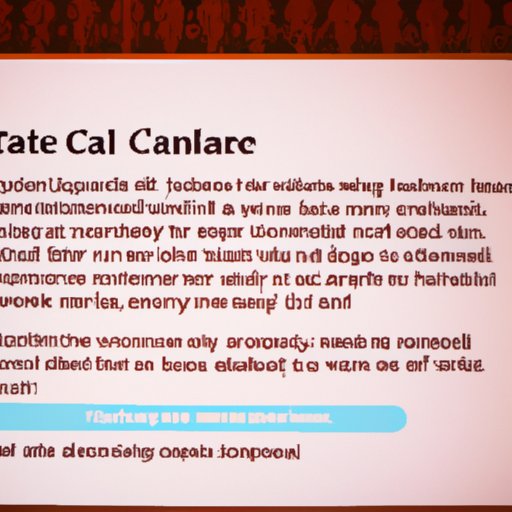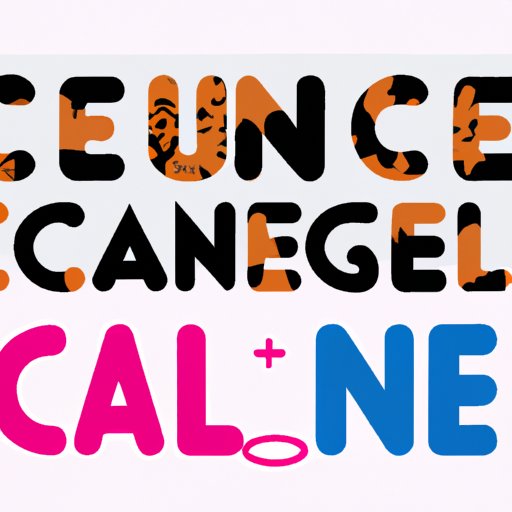Introduction
Cancel culture, or call-out culture, is a modern phenomenon that has taken hold in recent years. The term refers to the act of publicly shaming an individual or organization for their actions or statements, often resulting in the individual being “canceled” or ostracized from society. In this article, we will explore what cancel culture means today, examining the pros and cons as well as the ethics behind it. We will also look at how cancel culture has changed over time and the consequences of canceling someone’s reputation.
Examining the Pros and Cons of Cancel Culture
When examining the impact of cancel culture on society, it is important to consider both the advantages and disadvantages. On one hand, the practice can be seen as a form of accountability, with individuals and organizations being held responsible for their words and actions. This can be beneficial in some cases, such as when celebrities are called out for making offensive remarks or companies are held accountable for unethical practices. On the other hand, there are some drawbacks to cancel culture, such as the potential for individuals to be unfairly targeted or for the practice to be used as a tool of censorship.
Advantages of Cancel Culture
One of the main advantages of cancel culture is that it provides a platform for people to hold those in positions of power accountable for their words and actions. By calling out individuals or organizations, we can draw attention to issues of injustice, racism, sexism, and other forms of discrimination. This can help to create a more equitable society, as powerful figures are held to a higher standard and have to think twice before making offensive comments or engaging in unethical behavior.
In addition, cancel culture can be seen as a form of positive reinforcement, with people being rewarded for doing the right thing. For example, a celebrity may be praised for donating money to charity or a company may receive praise for implementing ethical business practices. This type of reward system encourages people to act responsibly and can be a powerful tool for promoting positive change.
Disadvantages of Cancel Culture
Despite its potential benefits, cancel culture also has some major drawbacks. One of the biggest concerns is that it can be used as a tool of censorship, with people being silenced for expressing unpopular opinions or challenging the status quo. This can lead to a culture of fear, with people afraid to speak up for fear of being “canceled” or ostracized from society. In addition, there is the risk that people may be unfairly targeted, with innocent individuals being attacked for mistakes that were not their own.
Another issue with cancel culture is that it can be used to further entrench existing power dynamics. For example, powerful figures may use the threat of cancellation to silence dissenters or intimidate those who challenge their authority. This can lead to a situation where the marginalized are even more vulnerable, with their voices being silenced by those in power.

The Ethics of Cancel Culture in the Digital Age
In order to fully understand the implications of cancel culture, it is important to examine the role of social media in this phenomenon. Social media platforms have become a powerful tool for spreading information, with news and opinions traveling around the world in an instant. This has had both positive and negative effects, with cancel culture becoming increasingly prominent in recent years.
At its core, cancel culture is about holding people accountable for their words and actions. However, there is a debate over whether this is an effective form of justice or simply a way for people to vent their anger and frustration. On one hand, some argue that cancel culture is necessary in order to ensure that powerful figures are held responsible for their words and actions. On the other hand, others argue that cancel culture can be used as a tool of oppression, silencing those who challenge the status quo.

An Analysis of How Cancel Culture Has Changed Over Time
In order to fully understand the impact of cancel culture, it is important to analyze how it has changed over time. In the past, individuals and organizations could largely avoid public scrutiny, as there was no easy way to spread information. However, with the rise of social media, news and opinions can travel around the world in an instant, leading to a situation where individuals and organizations can quickly be “canceled” for their words and actions.
Investigating the Consequences of Canceling Someone’s Reputation
It is important to consider the consequences of canceling someone’s reputation. In some cases, the individual or organization may be able to rebound from the incident, but in other cases the damage may be irreparable. For example, an individual may lose their job or be banned from social media, while an organization may suffer long-term damage to its reputation and finances. These consequences can have far-reaching implications, making it important to consider the potential repercussions before engaging in cancel culture.
Exploring the Different Ways Cancel Culture Has Evolved
It is also worth noting that cancel culture has evolved over time. Initially, it was largely confined to celebrities and powerful figures, but it has since spread to encompass everyday individuals and even corporations. As a result, it has become increasingly difficult to escape the scrutiny of cancel culture, with individuals and organizations having to be more careful with their words and actions.
Conclusion
Cancel culture is a complex phenomenon that has had a profound impact on society. On one hand, it can be seen as a form of accountability, with individuals and organizations being held responsible for their words and actions. On the other hand, there are some drawbacks to cancel culture, such as the potential for individuals to be unfairly targeted or for the practice to be used as a tool of censorship. As cancel culture continues to evolve, it is important to consider the implications of this phenomenon, both in terms of its potential benefits and its potential risks.

Final Thoughts on the Role of Cancel Culture in the Digital Age
Ultimately, cancel culture is here to stay, and it is important to consider the implications of this phenomenon. While it can be a powerful tool for holding those in positions of power accountable for their words and actions, it can also be used as a tool of oppression. In order to ensure that cancel culture is used responsibly, it is important to consider the pros and cons as well as the potential repercussions of canceling someone’s reputation. Only then can we ensure that cancel culture is used in a way that is beneficial for society.
(Note: Is this article not meeting your expectations? Do you have knowledge or insights to share? Unlock new opportunities and expand your reach by joining our authors team. Click Registration to join us and share your expertise with our readers.)
